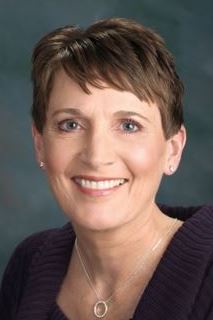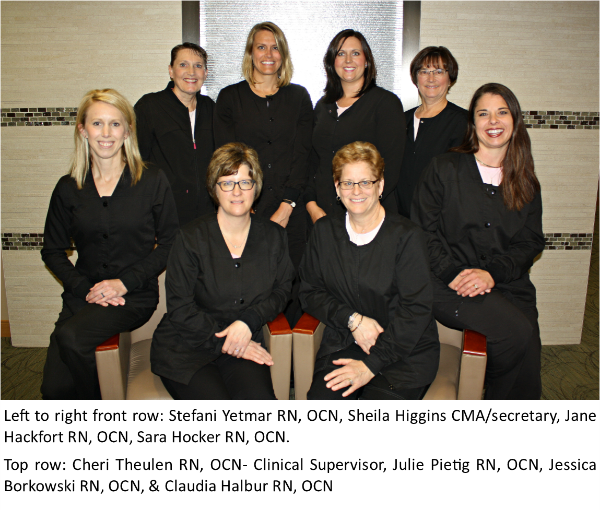posted
on 1/31/2019
in
Press Releases
Did you know that 100 percent of all nurses in the Infusion Center at St. Anthony Regional Hospital are oncology certified? Going above and beyond what is required, St. Anthony made the commitment to certify 100 percent of its oncology nursing staff to ensure its patients receive the highest quality of care.
“For a hospital of its size or even two- to three-times larger, it’s uncommon to have all oncology certified nurses,” said Robert Behrens, M.D., St. Anthony Board Certified Oncologist. “Most places try to get by with less, and I’m happy that St. Anthony exceeds expectations. This is a significant benefit to patients – being from this close-knit community – to know they are more than just a number, they are getting personalized care.”
“Having oncology certified nurses demonstrates the strong commitment that we have to our patients and the community,” said Cheri Theulen, RN, St. Anthony Director of Infusion Therapy and Same Day Surgery. “Oncology nursing certification ensures that nurses have met stringent requirements for knowledge and experience, and that they are qualified to provide competent oncology care.”
 Theulen, who has served St. Anthony for 37 years, shares the history of the hospital’s progressive approach to certification requirements.
Theulen, who has served St. Anthony for 37 years, shares the history of the hospital’s progressive approach to certification requirements.
“We have offered oncology services for nearly 25 years and have continued to expand our service line. Because we live in a rural community, the necessity for highly qualified, competent nurses was recognized. This enabled us to provide the same quality of care patients might receive in larger cities,” Theulen said. “The certification shows professional credibility and knowledge, and also creates development opportunities for the nursing staff.”
In fact, according to the American Board of Nursing Specialties survey, 86 percent of nurse managers prefer to hire certified nurses over non-certified nurses, when other skills and attributes are equal. Certification is also recommended by the Association for Community Cancer Centers Standards for Cancer Programs and the American College of Radiation Oncology Standards for Radiation Oncology.
Today, the St. Anthony Infusion Center, complete with 11 chairs, three of which are private rooms, operates under the watch of seven oncology certified nurses. The center conducts approximately 1,400 chemotherapy treatments each year. In addition to chemotherapy, the Infusion Therapy Department provides outpatient IV infusion therapy, such as IV administration of drugs to prevent bone loss, to treat rheumatoid arthritis, Chrohn’s Disease, and multiple sclerosis patients and to administer blood product transfusions, injections and other outpatient services. Outside of infusion treatment, the nurses also see over 600 patients annually to flush venous access ports, and more than 100 patients visit the Infusion Unit for the administration of blood products.
St. Anthony is proud to have an experienced infusion therapy staff with a collective total of more than 150 years of nursing experience.
“The drugs we use to treat cancer carry unique side effects that require someone with specialized training,” Behrens said. “We don’t want any surprises. The nurses in the Infusion Center are very experienced and know the precautions necessary to keep patients safe. It gives me confidence knowing how educated the nurses are.”
And, patients have taken notice. Heather Kusel of Manning, who is battling stage four breast cancer, visits the Infusion Center every third Monday for chemo treatment – and will do so for the rest of her life.
“There is no way I would get through what I’m going through without the oncology nurses at St. Anthony. They are my support system – they are more than just nurses, they’re like family,” Kusel said. “All of the nurses are wonderful. They are professional, friendly and go above and beyond for all patients, not just me.”
Kusel shares that with each interaction, the oncology nurses at St. Anthony make safety a top priority.
“With each step of administering my chemo treatments, the nurses take extra precaution when it comes to safety. From examining bloodwork and wearing protective clothing to cleaning my port, each step is done with purpose to ensure my safety,” Kusel said. “The nurses’ knowledge is evident with everything they do, as they explain the drug they are administering, its purpose and potential side effects.”
“Certification provides our patients with the confidence in knowing that we are committed to learning, to taking that extra step to know how to best serve them,” said Stefani Yetmar, St. Anthony Infusion Center Charge Nurse. “Certification covers disease management, side effects and much more, which gives patients confidence that those taking care of them are well-equipped to handle any situation. Chemotherapy impacts the body, specifically blood counts, and can pose life threatening effects if not handled properly. Having an oncology certified nurse means that individual is better prepared to recognize a potential problem and take immediate action if needed.”
Potential problems like nausea and pain, according to the Clinical Journal of Oncology Nursing, are the most commonly experienced side effects. In a recent survey, certified nurses scored higher on knowledge of pain and nausea than non-certified nurses.
St. Anthony requires at least one year of current nursing experience and completion of the oncology certification within two years of serving in the Infusion Center. In order to obtain certification as an oncology certified nurse (OCN), the registered nurse must be an active, licensed nurse with a minimum of one year experience and 1,000 hours of specialty nursing in oncology prior to taking the exam. The exam is a three-hour, 165 multiple choice test. The nurse also needs a minimum of 10 hours of continuing education in the specialty of oncology nursing.
In order to maintain certification, OCNs must complete a detailed exam every four years covering nine topic areas of: health promotion, screening and early detection; scientific basis for practice; treatment modalities; symptom management; psychosocial dimensions of care; oncologic emergencies, survivorship; palliative and end of life care; and professional performance.
“No matter what type of cancer a patient has, it’s important to know that the treatment options are based on research and clinical trials. These guideline recommendations determine the type of chemotherapy nurses administer,” Theulen said. “Hospitals across the country have access to the same drugs and treatment options, what makes all the difference is the standard of care. Certification shows a personal commitment on behalf of the nurse to oncology, the profession and patients.”
St. Anthony is committed to this continuing education, covering costs associated with the exam, continuing education hours and certification hours. This also helps to recruit and retain highly qualified nurses during a time when the country is facing a continuing shortage of medical professionals. And, with an aging population, comes additional demand for nurses who are knowledgeable about cancer care. According to the American Cancer Society, approximately 77 percent of all cancers are diagnosed in people age 55 or older. By the year 2030, more than one in five U.S. residents are expected to be 55 or older. This means, St. Anthony is ahead of the situation.
“St. Anthony administration does an outstanding job of encouraging oncology certification amongst its staff – it’s something that comes from the top,” said Mark Westberg, M.D., St. Anthony Board Certified Oncologist. “One hundred percent certification is the goal, it’s what all hospitals should aspire to. Certification sets the standard when it comes to education and gives me great confidence in the nursing staff at St. Anthony.”

Filter
- cancer
- cancer services
- cancer survivor
- chemo
- chemo treatments
- chemotherapy
- infusion therapy
- oncology
- oncology certified
- rad onc
- radiation oncology
- survivor